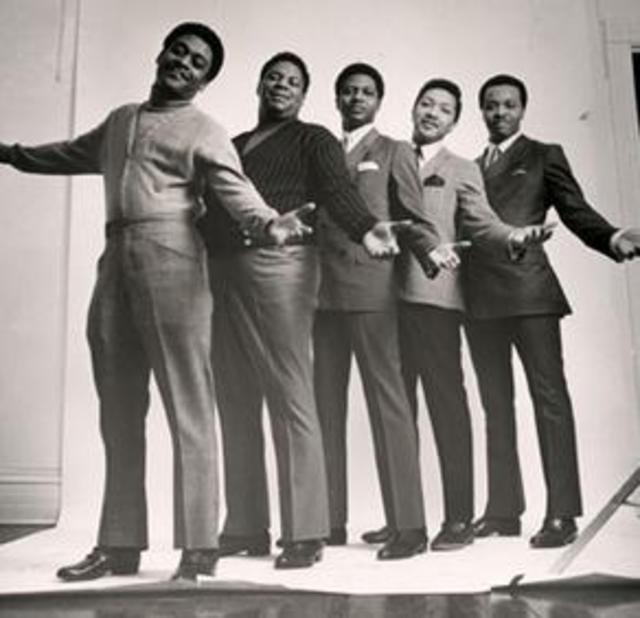The Dells

Inductees: Marvin Junior (vocals; born January 31, 1936, died May 29, 2013), Johnny Funches (vocals; born July 18, 1935, died January 23, 1998), Johnnie Carter (vocals; born June 2, 1934, died August 21, 2009), Chuck Barksdale (vocals; born January 11, 1935), Verne Allison (vocals; born June 22, 1936), Michael "Mickey" McGill (vocals; born February 17, 1937)One of the longest-running vocal groups in rock and roll history, the Dells date back to 1952. Between 1956 and 1992, the Dells racked up an astonishing 46 R&B hits. Eight of these made the pop Top 40, including their best-known songs, "Stay in My Corner" and "Oh, What a Night." The Dells are part of a great lineage of black harmony groups, including the Stylistics, the Delfonics and the Dramatics, and the phenomenal success of younger acts like New Edition, Boyz II Men, Backstreet Boys and N'Sync would be hard to imagine without them.The Dells came together at Thornton Township High School in Harvey, Illinois, a Chicago suburb. The group's original lineup included lead tenor Johnny Funches, second tenor Verne Allison, lead baritone Marvin Junior, baritone Michael "Mickey" McGill, bass singer Chuck Barksdale and second tenor Lucius McGill. Called the El-Rays, the group would gather on a street corner or in a subway station to perfect their singing. In 1953, they signed with Checker Records, a Chess Records subsidiary, and, in 1954, they released a single, "Darling I Know." The record didn't fare well, and, later that year, Lucius McGill left the El-Rays.The following year, the El-Rays changed their name to the Dells and signed with Vee-Jay Records, a Chicago-based R&B label. The group scored a major R&B hit in 1956 their second Vee-Jay single, "Oh What a Night." The record reached Number Four and sold more than a million copies. Rolling Stone magazine ranked the song Number 260 on its list of the 500 Greatest Songs of All Time. The Dells went on to release several more singles for Vee-Jay, including "Movin' On," "Why Do You Have to Go," "A Distant Lover," "Pain in My Heart" and "The Springer."Then, in 1958, while en route to a gig in Philadelphia, the group got into a serious car accident. Mickey McGill nearly lost one of his legs, and Marvin Junior suffered a laceration of his larynx. McGill had to be hospitalized for six months, and the Dells decided to take a hiatus.When they regrouped in 1960, Johnny Funches opted not to return, and Johnnie Carter – late of the Flamingos, and also inducted into the Rock and Roll Hall of Fame with that vocal group – replaced him. The Dells were holding down regular jobs and performing on weekends, but after winning an audition as Dinah Washington's backup group, they returned to music full-time. They toured with Washington from 1961 to 1962. "She put us on our feet," said Barksdale, "and we began to understand how this business is supposed to go." The Dells then moved in a mellower jazz and pop-harmony direction, a la the Four Freshmen and the Hi-Lo's.When Vee-Jay shut down in 1966, the Dells moved back to Chess, signing with the label's Cadet subsidiary. With producer Bobby Miller and arranger Charles Stepney, the group began cutting hits in a solid R&B vein again. There Is, released in 1968, was a unique combination of Fifties doo-wop harmonies and orchestrated Sixties soul. The highly successful album yielded four hits, including the title track, which made it to the Top 20 on the pop charts. Other hits that year included "There Is," "Always Together" and "Stay in My Corner." The latter song became the Dells' first big pop hit, reaching the Top 10 on the pop charts and Number One on the R&B chart. The following year, the Dells recorded a more soulful version of "Oh What a Night." The song topped the R&B chart and made it into the Top 10 on the pop charts. Once again, it sold more than a million copies. The group also scored a hit in 1969 with a medley of "I Can Sing a Rainbow" and "Love Is Blue."The Dells recorded prolifically for Cadet through the mid-Seventies, and their more noteworthy releases included 1971's Freedom Means, 1974's The Mighty Mighty Dells and 1975's We Got to Get Our Thing Together. In 1974, they teamed with the Dramatics to cut The Dells vs. the Dramatics. In 1975, the Dells left Cadet and went onto record for Mercury, ABC, 20th Century Fox and Virgin. At Mercury, the group scored with "We Got to Get Our Thing Together" and "Our Love." While at ABC, the Dells scored a minor hit with "Super Woman." They also cut tracks with George Clinton and Parliament-Funkadelic. Then, in 1991, actor-director Robert Townsend contacted the group. He was developing a new film called The Five Heartbeats, about a fictional soul-singing group, and he asked the Dells to record the theme song for the movie. Called "A Heart Is a House for Love," the single reached Number 13 on the R&B charts, making the Dells one of the few groups to have scored hits in the Fifties, Sixties, Seventies, Eighties and Nineties.The late Nineties saw the release of two Dells compilations: Oh, What a Night!: The Great Ballads (MCA) and Anthology (Polygram). Then, on January 23, 1998, Johnny Funches died of pneumonia. In 2000, the Dells released a new album, Reminiscing, on the revived Volt label. Two years later, the Dells celebrated their 50th anniversary – an amazing feat of talent and perseverance.Two other members of the Dells have also died. Johnny Carter died of cancer on August 21, 2009, and Marvin Junior died of kidney failure on May 29, 2013.The Dells were inducted into the Vocal Group Hall of Fame in 2004, the same year they were inducted into the Rock and Roll Hall of Fame.